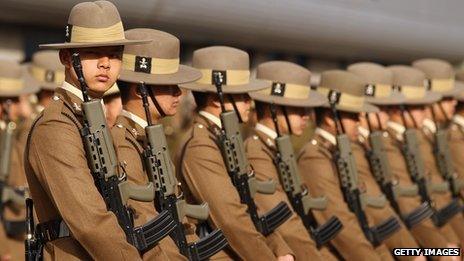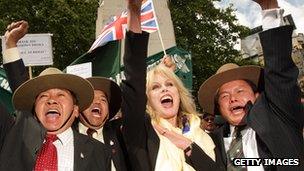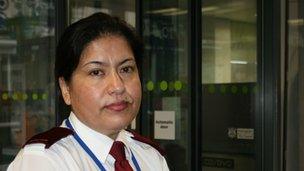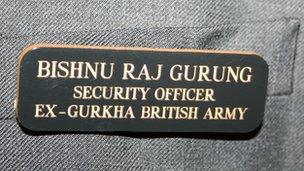How Gurkhas came to be Britain's new security army
- Published
- comments

Gurkha soldiers have been part of the British Army for nearly two centuries
The influx of Gurkhas into the UK, after a very public campaign, sparked a debate about their welfare and the cost to the public purse. But many of them are already playing a vital role.
Most British people will know something of the Gurkhas.
The fearsome Nepalese soldiers have been part of the British Army for almost 200 years, their motto is "Better to die than be a coward" and they still carry their traditional weapon - an 18in long curved knife known as the kukri - into battle.
Others might not remember the historical facts but they will recall the fierce battle to give retired Gurkhas the right to settle in the UK.

The euphoria of winning settlement rights has given way to welfare and economic concerns
The campaign, led from the front by the actress Joanna Lumley, captured the public's attention and caused some red faces in Parliament.
The campaigners were victorious and since the rules changed in 2009, just over 9,000 applications for settlement from Gurkhas - including their dependants - have been approved.
There has been much debate as to the impact of this influx. The MP for Aldershot, where an estimated 10% of the population comes from Nepal, has said the town has been "overwhelmed".
Gerald Howarth says the elderly Nepalese, in particular, are putting a strain on local resources and the Gurkhas should be dispersed around the UK to spread the financial burden. On Monday, the government announced the local council would receive £1.5m to meet "immediate resource pressures".
It has been suggested that some Gurkhas are struggling to cope with the cost of living in the UK, with the British Gurkha Welfare Society saying about 25,000 of those who retired before 1997 still only receive a third of the pension of their British and Commonwealth former comrades.

Pte Bhuwasing Limbu has swapped Nepal for Nottingham
But a recent study suggested that Gurkhas of working age are the most economically active and self-reliant social group in Britain.
The University of Kent research found the employment rates among Gurkha men and women are particularly high, at 95% for men under 60 and 93% for women under that age.
It also showed that security is the most popular job for male veterans. Ex-military people joining the security industry is nothing new, but security companies are capitalising on the Gurkhas' formidable reputation.
G4S set up Gurkha Services in 2007 and it now employs at least 600 people across 27 contracts.
They are involved in guarding the UK's "critical infrastructure", such as power stations and railways, from vandals, protesters and thieves. Rarely a day goes by without some story about how cable theft has disrupted a train journey or caused a power outage. Now Gurkhas are the new front line against the crime wave.
A smaller rival of G4S - Octavian, which has its headquarters in Nottingham - first started using Gurkhas in 2005.
Their skills were made clear to the company a year later when they sent five of the ex-soldiers to guard a crime-ridden car park in the city's Giltbrook area.
"They reduced crime rates to nil and since then we have not stopped using them," says commercial director Tony Mellor.
Octavian employee Pte Bhuwasing Limbu says working in security feels natural.
The 50-year-old rifleman has worked on construction sites, power stations and car parks. He talks about dealing with "mostly drunken teenagers" but he did on one occasion help disarm a knife-wielding trespasser at a stately home before handing him over safely to the police.
In addition to it being familiar territory, there are practical reasons why so many Gurkhas are attracted to security jobs, which are often low-paid and involve antisocial hours.
Nina Gurung, who carried out the University of Kent study, says it is a "relatively stable and comfortable" job for former Gurkhas.
"For many of them, language might be a barrier and with security, you just do your job and go home."

Family affair: It is not just former Gurkha soldiers who are being employed as security guards
Octavian does not only hire former soldiers. Prem Dewan, 22, is following in his father's footsteps, not into the British Army, but into the security business.
"We are doing this for day-to-day living," he says. "It's a dependable job and there's big demand in the security field."
Tara Gurung, 42, who was on duty at the Nottingham City Contact Centre, a "one-stop shop" for advice about benefits and council services, says security is now a "family thing".
"My husband, my son and myself are all in security. I am very happy to come here and I'm really proud."
Her husband L/Cpl Bishnu Raj Gurung works for another security company and the imposing 45-year-old works a few streets away in another council building.
It is a far cry from his service in Bosnia and his days on the Hong Kong/Chinese border but he says working as a security guard in the UK offers his family a much better life than they would have in Nepal.
"It is a similar job," he says. "I know how to look for threats and handle difficult situations."
The whole business of guarding installations, anticipating threats and acting swiftly is innate to the way they have been trained.
Selection for a Gurkha unit in the Army is notoriously rigorous - out of 28,000 applicants last year, only 230 soldiers were enlisted.
All Gurkha soldiers are recruited in Nepal, with retired Gurkhas touring remote villages conducting screening tests. Perhaps the best known and most gruelling selection test is the doko race - a two-mile run up a steep hill carrying 35kg of rocks in a basket.
Noah Price, operations director of G4S Gurkha Services, says these men are the "fittest of the fittest" because they have been born in the foothills of the Himalayas. But they come from a background where poverty is rife and infant mortality high.
"They have survived this struggle from birth and then we have selected the best of the best into the British Army."

Security companies are keen to highlight the Gurkha background of their employees
Price, a former Gurkha officer, says: "They can see things that you and I cannot see."
They hardly ever get sick. Price recalls just two workers being sent home - one because of a burst appendix, the other with a broken rib. He says the Gurkha with the broken rib was reluctant to leave his post.
Price has also recently noticed that very few of his men wear glasses.
"They are robust, strong and hardy individuals who are absolutely dedicated to the job. When they are stuck in a cold field at three o'clock in the morning, I know they are doing their job."
There's also a psychological aspect that encourages security firms to take them on.
"Criminals do not want to come against them," says Mellor.
- Published27 July 2010
- Published20 September 2011
- Published1 September 2011
- Published31 July 2011